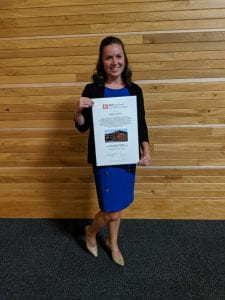On May 27th, Megan Danell (Baker Lighting Lab), Maria Amundadottir (OCULIGHT analytics), and Siobhan Rockcastle (Baker Lighting Lab) were awarded the Best Paper Award at SimAUD 2020. Their paper, titled ‘Evaluating Temporal and Spatial Light Exposure Profiles for Typical Building Occupants,’ was selected from among 72 peer-reviewed and accepted papers for it’s quality, originality, and significance. To read our paper, you may access it online here. SimAUD is an international Symposium on Simulation in Architecture and Urban Design and just celebrated its 11th consecutive year through on online venue (original planned for Vienna, but made virtual in response to COVID-19).
Check out our virtual presentation for SimAUD 2020
Due to the unique global circumstances surrounding 2020, SimAUD has gone entirely online this year. Check out the virtual recording of our paper titled, “Evaluating Temporal and Spatial Light Exposure Profiles for Typical Building Occupants.” This work was co-authored by Megan Danell, Maria Amundadottir, and Siobhan Rockcastle and represents an interdisciplinary, simulation-based approach to assessing circadian lighting through building occupant profiles.
Collaborative Research on Occupant-Centric Circadian Health Presented at Build Health 2020
Recent simulation-based research conducted by Siobhan Rockcastle (Baker), Megan Danell (Baker), Maria Amundadottir (OCULIGHT analytics), Robert Lochner (SRG) and Lisa Petterson (SRG) was just presented at the Institute for Health in the Built Environment’s Annual Industry Consortium Symposium, Build Health 2020. This research uses simulation to compute occupant-specific light exposure profiles for 38 occupants in a side-lit office space, accommodating their spatial and temporal dynamics as they move throughout the office. A version of this work will be presented at the ACEEE Summer Study on Energy Efficiency in Buildings in August.
Paper accepted to the ACEEE Summer Study on Energy Efficiency in Buildings
A paper co-authored by Siobhan Rockcastle (Baker), Megan Danell (Baker), Lisa Petterson (SRG Partnership), and Maria Ámundadóttir (OCULIGHT analytics) has been accepted for oral presentation at the ACEEE Summer Study on Energy Efficiency on Buildings. This paper, titled ‘The Impact of Behavior on Healthy Circadian Light Exposure Under Daylight and Electric Lighting Scenarios,’ presents a simulation-based method to compare the healthy light exposure of dynamic spatial and temporal occupant profiles using surveyed data.
Baker researchers go Virtual with a grant from PNNL
Researchers from the Baker Lighting Lab will compare the perceptual accuracy of LED lighting environments using a range of industry leading VR HMDs. In a time of physical separation from the world around us, our team of student and faculty researchers will explore differences in visual perception between the screens that define our virtual frontier. This work is supported by the generous support of a grant from the Pacific Northwest National Laboratory.
paper co-authored by Danell and Rockcastle accepted to SimAUD 2020
A collaborative paper, ‘Evaluating temporal and spatial light exposure profiles for typical building occupants,’ co-authored by Megan Danell and Siobhan Rockcastle from Baker Lighting Lab and Maria Amundadottir from Oculight analytics was just accepted to SimAUD 2020 in Austria. Thanks to the support of Lisa Petterson at SRG partnership in Portland, our team was able to simulate occupant profiles in a digital model of SRG’s office space and compare their circadian health in a new temporally and spatially-resolved simulation workflow.
Megan Danell (M.Arch ’20) will present this paper to an international audience in May!
Zach Suchara, Director of Luma Lighting to Lecture in Eugene on November 7th
Zach Suchara will give a guest lecture in IARC 492/592 Electric Lighting on November 7th at 6:oopm in LA206. This lecture is open to the public and anyone interested is welcome to join!
Zach’s Bio: Zach joined Luma in 2006 and oversees the management, development, and growth of the firm. He has extensive experience with projects throughout the Pacific Northwest and California, and beyond—Luma’s experience currently extends across the U.S. and into Asia and central Europe. As a registered architect in the state of Oregon with over 20 years of experience in architecture and lighting design, Zach strives to continually reinforce humanistic integration with the natural and built environment. For him, light is more than a medium to apply to architecture. It is a foundational component for shaping human experience. Zach’s passion for holistic, sustainable, and humanistic design integration is evidenced by his diverse, award-winning project work, national and international speaking engagements, and participation in multiple industry organizations such as the AIA, IES and AFO.
Dr. Rockcastle and Dr. Van Den Wymelenberg to Present ‘Current Trends in Daylighting’ at PG&E on November 14th
Kevin Van Den Wymelenberg and Siobhan Rockcastle from the University of Oregon’s Institute for Health in the Built Environment and Baker Lighting Laboratory will discuss why we should still consider controlled daylight an essential part of high performance and occupant supportive building design. The instructors will address daylight’s role in improving health, well-being, productivity, and energy-efficiency, even as LEDs and on-site photovoltaic electric generation converge to seemingly erode the business case for daylighting.
Find more info about this event here.
Baker Graduate Assistant, Megan Danell wins a regional AIA Honor Award
University of Oregon Publishes White Paper on Light, Views, and the Workplace Experience
The white paper, “The Impact of Lighting and Views in the Workplace of the Future,” explores how light and the visual environment impact performance, comfort, and satisfaction of the occupant
Eugene, OR (August 12, 2019) – Today, the University of Oregon published a new white paper, “The Impact of Lighting and Views in the Workplace of the Future.” The paper concludes that daylit spaces with controlled lighting and views can improve occupant well-being, workplace productivity, and satisfaction by positively influencing various physiological and psychological processes. Lighting and views also impact property value and employee recruitment and retention.
To learn more about the emerging evidence and our interpretation, read our whitepaper here.
“The Impact of Lighting and Views in the Workplace of the Future” white paper, which was sponsored by Lutron Electronics, was presented at the Illuminating Engineering Society Annual Conference in Louisville, August 2019.

